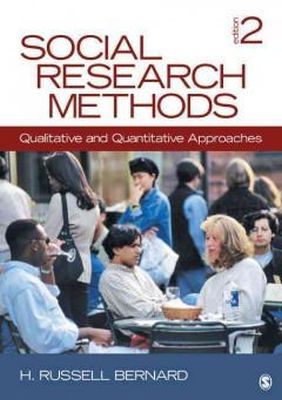
Stock image for illustration purposes only - book cover, edition or condition may vary.
Social Research Methods
H. Russell Bernard
FREE Delivery in Ireland
Description for Social Research Methods
Hardcover. Using genuine examples from across the social sciences the Second Edition provides extensive in depth treatment of the subject matter to provide readers with both a conceptual understanding of each method as well as showing them how to apply it. Num Pages: 824 pages, Illustrations. BIC Classification: JHBC. Category: (U) Tertiary Education (US: College). Dimension: 257 x 184 x 37. Weight in Grams: 1448.
This text provides a comprehensive guide to doing research in the social and behavioral sciences—from research design and sampling to collecting and analyzing data. Rich in examples, the book has been revised and updated to provide today′s students with a conceptual understanding of each qualitative and quantitative technique, as well as showing them how to use it.
"The main strength of this text is coverage of both quantitative and qualitative methodology from a broad range of fields. The examples are often my students′ favorite thing to discuss in class." -Erica B. Gibson, University of South Carolina
"Bernard does an excellent job of ... Read morenot only showing how to practice research but also provides a detailed discussion of broader historical and philosophical contexts that are important for understanding research." -Julian Kilker, University of Nevada, Las Vegas
"The depth of detailed descriptions (foundations of social research; interviewing, participant observation, field notes, and data analysis) go beyond other texts…the organization is superb." -Benedict J. Colombi, University of Arizona
Show Less
Product Details
Publisher
SAGE Publications Inc United States
Place of Publication
Thousand Oaks, United States
Shipping Time
Usually ships in 4 to 8 working days
About H. Russell Bernard
H. Russell Bernard is Professor of Anthropology, Emeritus at the University of Florida. He served as editor of the American Anthropologist and Human Organization. He is co-founder (with Pertti Pelto and Stephen Borgatti) of the Cultural Anthropology Methods journal (1989), which became Field Methods in 1999. The five editions of his methods text Research Methods in Anthropology (AltaMira 2006) and ... Read morehis general research methods text Social Research Methods (Sage 2012), have been used by tens of thousands of students. Bernard co-founded (with Pelto) and co-directed (with Pelto and Borgatti) the National Science Foundation′s Institute on Research Methods in Cultural Anthropology and has done fieldwork in Greece, Mexico, and the U.S.A. His publications include (with Jesús Salinas Pedraza) Native Ethnography: A Otomí Indian Describes His Culture (Sage, 1989). Bernard is known as well for his work, with Peter Killworth, Eugene Johnsen, Christopher McCarty, and Gene A. Shelley, on network analysis, including work on the network scale-up method for estimating hard-to-count populations. In 2010, Bernard was elected to the National Academy of Sciences. Show Less
Reviews for Social Research Methods
“The main strength of this text is coverage of both quantitative and qualitative methodology from a broad range of fields. The examples are often my students’ favorite thing to discuss in class.”
Erica B. Gibson “Bernard does an excellent job of not only showing how to practice research, but also provides a detailed discussion of broader historical and philosophical ... Read morecontexts that are important for understanding research.”
Julian Kilker “The book includes a thorough presentation of quantitative and qualitative methods, including formulas and statistics for quantitative methods. Bernard is one of very few methods authors who includes and explains statistical methods, not just the methods used. Moreover, the book is very comprehensive and uses lots of examples to explain the material in depth.”
Monika Ardelt “The depth of detailed descriptions (foundations of social research; interviewing, participant observation, field notes, and data analysis) go beyond other texts that I’m aware of, and the organization is superb. The text contains strong descriptions of positivist versus humanistic traditions and splits in social research. It also includes great detail on how to successfully operationalize research variables. The discussion on theory as a “mechanism” and how to choose problems is easily understood and effective. Moreover, the author’s emphasis on making personal interest a high priority in choosing a research topic is critical and primary.”
Benedict J. Colombi ′There is considerable detail on the history and philosophical foundations of social and behavioural research, ranging from the ‘what’ to the ‘how-to’ of social research. To make sure the message of each chapter is clearly communicated [Bernard] employs a wealth of examples and reading lists. He also provides the reader with a description of key concepts employed in each chapter.′
Maryam Nazari & G.E. Gorman
Online Information Review
Show Less

